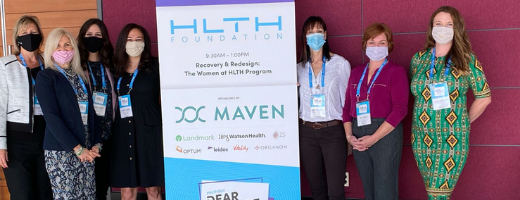Last week, Vitality attended HLTH 2021 in Boston, a large health innovation conference, where we heard from inspiring leaders pushing the envelope to solve healthcare’s most pressing problems and realize the most promising opportunities to create health’s future. Our own Dr. Jenny Carrillo, SVP of Health Solutions & Enterprise, moderated a panel discussion on the impact of the pandemic on women and what healthcare organizations can do to help achieve gender equity in health and wellbeing, and Elizabeth Dunphy, SVP of Operations, spoke on a panel about the latest innovations in employer-sponsored health and wellness benefits.
One of the biggest takeaways from the conference was the emphasis on addressing the mental health crisis our country is currently facing. We heard speakers touch on the “twindemic” Black employees have faced – race as a public health crisis as well as COVID-19, resulting in increased levels of stress without adequate support due to stigma around mental health issues and mistrust of the medical system in the community. We also heard discussions of the disproportionate amount of labor at home that women, especially women of color, have taken on during the pandemic, which has led to increased mental health issues and decreased productivity at work.
Of particular concern is the mental health impact felt by younger employees. The shift to remote work has meant longer hours on laptops and more Zoom meetings, and for a generation that is already so tethered to digital tools, the last thing they needed was another mode of technology in their lives. Instead, they are craving authentic connection and meaningful support from their employer.
These takeaways from HLTH 2021 are very much in line with the findings of our own research. Vitality recently published Healthy Hybrid: A Blueprint for Employers to Achieve Post-Pandemic Return-to-Work Success, a survey of 3,000 international employees from the US, the UK, and South Africa across a spectrum of industries, generations, and work settings. Our US findings demonstrate that a significant number of employees are anxious about having to adapt to a new way of working once again. Concern over returning to the office is high, with 87% feeling at least a little anxiety and 36% feeling extreme anxiety, such that if required to return to the office full-time, 45% of hybrid employees and 60% of remote workers would be at risk of quitting.
Well-being, mental health and emotional support have become more important for employees in the past year and managers play an integral role in meeting those needs. For example, 73% of employees say their manager helping them maintain a life and work balance is moderately to extremely important; yet may don’t expect their manager will actually allow them time out of their day to do various activities that would support such balance, like exercising (27%) or participating in well-being-promoting activities organized by work (26%). Further, the programs employers have put in place to support employees have not trickled down to more junior employees. Across well-being dimensions, entry-level employees are much less satisfied (ranging from 34% to 41%) than senior employees (ranging from 62% to 64%), with younger, entry-level employees feeling significantly less supported by their managers as related to maintaining mental health (21%) while 42% of senior employees feel supported.
Our time at HLTH 2021 and our findings from the Healthy Hybrid survey make one thing crystal clear – Organizations must pay attention to their employees and do a better job of supporting their needs. Organizations are beginning to seek ways to address the mental health crisis facing their workers and should take advantage of the “crisi-tunity” that has presented itself to think thoughtfully about how to use employee insights to transform work culture for the better.
Stay tuned for additional coverage from HLTH!
Lianne E. Jacobs, MPH, Health Communications Strategist, has a master’s degree in public health from Yale University. She is the only indoor cycling instructor who can’t ride a bike. She enjoys traveling the world, laughing at her own jokes, and tricking her husband into eating baked goods made with hidden vegetables.








